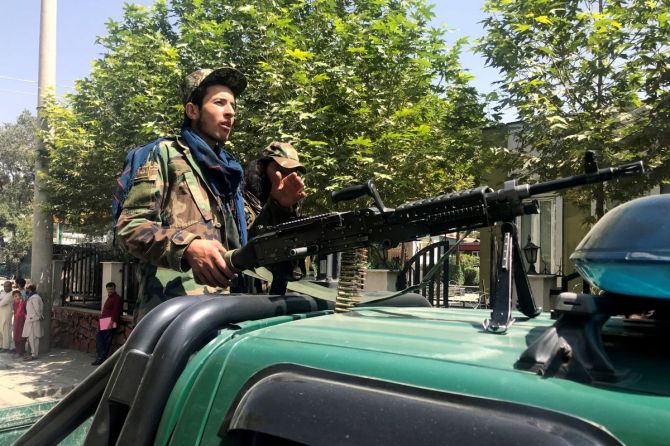India has much paranoia in India about a new 'Terroristan' coming up between Pakistan and a Taliban-ruled Afghanistan.
Pakistan has zero ability economically, diplomatically, geostrategically or militarily to create one.
If they try, it will be great for India as they will destroy themselves yet again, asserts Shekhar Gupta.

The turn in Afghanistan highlights a vital paradox in our strategic culture.
So heavily is debate in and about our subcontinent overwhelmed by history that geography is given short shrift.
Never mind that it is the all-important 'geo' in geopolitics and geostrategy.
An important question then follows. Does history shape geography, or is it the other way around? It sounds like the old "chicken-or-egg" question.
But the fact is, that in the vast region of strategic challenge to our west, geography has shaped history.
We're explaining what persuades us to say so.
And then arguing why all of this can change, and why geography is poised to lose its dominance over the subcontinent's future.
The central pillar of the argument is that geography has been Afghanistan's strategic curse, Pakistan's blessing, and India's distraction. This is how:
Afghanistan has always been the ultra-poor, deeply conservative, tribal, sparsely populated and loosely governed land-locked nation lying between the warring great powers of the day.
That makes it a battlefield for global powers.
With enormous collateral damage and no benefits.
Imperial Britain and Czarist Russia in the 19th century, the Soviet Union and the US in the 20th century, and between the US and its new global adversary, the stateless but pan-national al-Qaeda in the 21st century.
In the first two instances, its location next to the softest part of the Soviet Union's Islamic, Central Asian underbelly was its burden.
Now, it was the detritus of the last of those great wars fought here, between the Mujahideen as US proxies and the Soviets.
That war leaves behind victorious Islamic insurgents and terrorists.
Some of them now founded the Taliban, and decided with their multinational "brothers" to conquer the world, given the distance, stealth, and sanctuary in Afghanistan's.
Its location made it the 'bali ka bakra' or sacrificial goat in the Great Game, the Cold War and the War on Terror.
This is how you define a strategic curse.
The Great Game passed Pakistan by as it came into being only in 1947 and inherited colonial India's borders to the west.
Geography made it the frontline State in the first Cold War because it shared a long border, a religion, tribal ties and access to Afghanistan, already a big power battlefield bordering the USSR.
America courted it as a frontline State from the 1950s on, bringing it into their formal military alliances, even flying U-2 spy planes over the Soviet Union from Peshawar.
In fact, the U-2 shot down in 1960 by the Soviets, which took its pilot Francis Gary Powers prisoner, had operated from Peshawar.
Pakistan's only utility to the US-led Western Bloc was where it sat on the world's map.
It became doubly important in 1971 as physical and political proximity with China made it the jumping board and matchmaker in the Nixon-Kissinger outreach to Beijing.
The same geography kept showering more strategic gifts on Pakistan as the Cold War shifted to Afghanistan with the Soviet invasion in 1979.
The Americans came again, with the goodies, the gravy train, and dirtiest of dirty tricks of subversion that pupils in the ISI mastered better than the teacher.
The Cold War won, with the Afghan defeat ultimately triggering Soviet disintegration exactly three decades ago, Pakistan had lost its history-shaping geo-strategic blessing.
For nearly a decade it kept diminishing in the American worldview.
This was also when a US warming up to India and the de-hyphenation of its policy on the subcontinent began.
But Pakistan's locational luck was to return within exactly a decade as those planes slammed into the twin towers in New York and its masterminds and their network were tracked in the region to be now defined as Af-Pak.
The American gravy train was back.

Where did geography place India after 1947, and why do we call it the biggest distraction for our strategic thought? India inherited about 15,000 km of land borders.
On the day it became independent, about a half of it was abutting Pakistan, a military adversary from day one.
China, next to half of the rest, emerged as a threat in less than a decade.
This hasn't changed except to the extent that the eastern frontiers are now shared with a friendly Bangladesh.
But, this moved India's strategic thought entirely to the land borders.
Many large and small wars have been fought there, mostly for tiny slivers of territory, if any at all.
Our strategic thought therefore became land border-oriented.
We constantly thought Pakistan, terrorism, China and became reactive and defensive.
The reason we call this a distraction, and a terrible one, is that it took our attention away from India's vast 7,500 km-plus coastline.
See it this way. Our land borders became a chronic strategic burden as a military threat.
It took away our attention from our varied coastline, straddling some of the world's most important sea lanes, with enormous exclusive economic zone and island assets on the east and the west, a region of incredible opportunity.
For 75 years, India's strategic thinking has been so distracted by a threat that it had no time for our opportunity.
Why did we start out saying that the latest turn in Afghanistan can likely change for all three?
How can it rid Afghanistan of its geographical curse, rob Pakistan of its blessing, and give India a respite from its distraction?
Russia is now a bit power and its stake in Afghanistan is to only ensure the Talibani virus doesn't infiltrate the Central Asian republics, or what the Americans sometimes call the 'Stans'.
Nobody now needs to come to Afghanistan to fight Russia.
Or China.
For China, the concerns are very similar to Russia's: Shield Xinjiang and its Muslim Uyghurs from the same virus.
It wants no more power games in Afghanistan.
That denies Pakistan its status either as a frontline State, or a 'stalwart ally' in the war on terror.
However awfully Joe Biden may have disgraced himself with his bumbling incompetence, he isn't about to send Pakistan a thank-you card and a hundred F-16s for helping the Taliban defeat him so humiliatingly.

On the other hand, if Afghanistan unravels again, Pakistan will now be on its own.
Even the Chinese will then weigh their options as a stable Afghanistan is vital for their mega CPEC investments.
They will expect Pakistan to ensure that, not to subvert it again by using it for strategic depth for its terror groups: Oh, we didn't know about Pulwama.
The Jaish planned it in Helmand, as they told Adrian Levy and Cathy Scott-Clark, authors of SPY STORIES: Inside the Secret World of the RAW. and the ISI, their latest.
The Pakistani track record in learning from their blunders isn't great, but somebody there might realise that the last time they did it (until a week ago), it was the Taliban using Pakistan for their own strategic depth.
.
In the first phase of the Cold War, this blessing of geography cost them more than half their country (1971), in the second (1979-91) they destroyed their infant democracy and institutions, and brought in Islamisation.
In those turbulent years their per capita income was 60 per cent higher than India in 1990 (PPP basis, World Bank data).
Now, India's GDP per capita on a PPP basis is 32 per cent higher.
That, when India has worked hard over the past couple of years to narrow the gap.
The average citizen in the nation Pakistan lost in 1971, Bangladesh, today, is the richest of the three nations created in the Subcontinent after Independence.
Shorn of American benevolence, Pakistan has zero capacity to threaten India through Afghanistan.
It will be scrambling to save its own western regions.
This is the reason we say the latest turn in Afghanistan's history has changed the dominance of geography in our region.
If only we in India would leave our Pakistan obsession aside, even forget Afghanistan for now, focus on our maritime power and opportunity rather than overland threats.
This is India's greatest opportunity in 75 years to shift its strategic gaze from the north to the south.
By Special Arrangement with The Print
Feature Presentation: Aslam Hunani/Rediff.com












 © 2025
© 2025